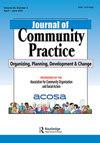通过行动研究伙伴关系共同学习灾害知识
IF 1.2
Q2 SOCIAL WORK
引用次数: 0
摘要
作为共同研究人员,与那些应对气候相关威胁的人同行,正在对复杂和混乱情况下社区行动的潜力产生新的认识。行动研究使学术界、政府、非政府组织和社区成员能够协作学习,建立细致入微和情境化的知识。虽然这种方法旨在破坏与知识生产有关的传统权力,但它继续为合法性而斗争,因此,政策和实践的牵引力,不舒服地坐在实证主义经验战略主导的领域中,即“单一真理”。本文借鉴了两个行动研究案例——第一个是多合作伙伴基于地点的参与,第二个是与澳大利亚两个州的慈善组织的学习伙伴关系——来说明我们如何在塑造我们共同构建知识的努力的权力轮廓中进行导航。根据这些经验,我们确定了成功的行业/学术行动研究伙伴关系的两个关键挑战:转移权力和将知识转化为更广泛的受众。最后提出了改进未来行动研究实践的建议。关键词:学习、行动、研究、灾难、伙伴关系披露声明作者未报告潜在的利益冲突。这项工作得到了新南威尔士州农村和区域更新基础设施基金会的支持。本文章由计算机程序翻译,如有差异,请以英文原文为准。
Learning together about disasters through action research partnerships
ABSTRACTWalking along side those responding to climate-related threats as co-researchers is surfacing new understanding of the potential for community action in complex and chaotic situations. Action research enables academia, government, non-government organizations and community members to learn collaboratively, building knowledge that is nuanced and contextualized. Whilst this approach aims to disrupt traditional power in relation to knowledge production, it continues to struggle for legitimacy and, hence, policy and practice traction, sitting uncomfortably in a field dominated by positivist empirical strategies a “single truth.” This article draws on two action research case studies – the first a multi-partner place-based engagement and the second a learning partnership with a philanthropic organization operating across two Australian States – to illustrate how we might navigate the contours of power that shape our efforts to build knowledge collaboratively. Drawing on these experiences we identify two key challenges to successful industry/academic action research partnerships: shifting power and translating knowledge to broader audiences. We conclude with ideas to improve future action research practice.KEYWORDS: Learningaction researchdisasterspartnerships Disclosure statementNo potential conflict of interest was reported by the author(s).Additional informationFundingThe work was supported by the Foundation for Rural and Regional Renewal Infrastructure NSW.
求助全文
通过发布文献求助,成功后即可免费获取论文全文。
去求助
来源期刊

Journal of Community Practice
SOCIAL WORK-
CiteScore
2.40
自引率
18.20%
发文量
27
期刊介绍:
The Journal of Community Practice is an interdisciplinary journal grounded in social work. It is designed to provide a forum for community practice, including community organizing, planning, social administration, organizational development, community development, and social change. The journal contributes to the advancement of knowledge related to numerous disciplines, including social work and the social sciences, urban planning, social and economic development, community organizing, policy analysis, urban and rural sociology, community health, public administration, and nonprofit management. As a forum for authors and a resource for readers, this journal makes an invaluable contribution to the community"s conceptualization, applications, and practice.
 求助内容:
求助内容: 应助结果提醒方式:
应助结果提醒方式:


